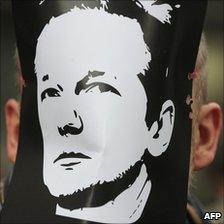Wikileaks: Julian Assange v Sweden's broad sexual laws
- Published

Julian Assange is in custody until an extradition hearing on 14 December
Julian Assange, the founder of Wikileaks, is fighting against extradition from Britain to Sweden where he faces allegations of rape and coercing women into having sex - accusations which his defenders say are part of a conspiracy to silence him. Stephen Evans reports from Stockholm on how Swedish law may prove difficult for the Wikileaks founder.
Everybody you talk to in Sweden involved in the Julian Assange affair asserts - often with some irritation - that: "There Is No Conspiracy."
The Swedish authorities are not acting at the behest of the CIA or the American embassy in Stockholm when they make life difficult for the founder of Wikileaks.
Tough laws
The lawyer for the two women who have accused Mr Assange of coercing them sexually told the BBC it was not part of some wider, global plot.
"Absolutely not," said Claes Borgstrom. "I represent two women who have experienced something that many thousands of women both in Sweden and in other countries have experienced."
Sweden has one of the toughest laws on sexual crime in the world - lawyers sometimes joke that men need written permission first.
As Mr Borgstrom put it: "It is not necessary to have a lot of violence. That is what people usually think, but in practice if you force someone to have sex with you against their consent you don't have to use much violence at all. Or you can take advantage of a difficult situation for the woman in question."
He says Mr Assange knows that this case is simply a matter of what happened with the two women rather than a bigger conspiracy.
"I'm very much critical of Julian Assange himself because he knows that that is not the case. He should say it has nothing to do with his engagement with Wikileaks," said Mr Borgstrom.
Three categories
Under Swedish law, there are legal gradations of the definition of rape.
There is the most serious kind, involving major violence.
But below that there is the concept of 'regular rape', still involving violence but not violence of the utmost horror.
And below that there is the idea of 'unlawful coercion'. Talking generally, and not about the Assange case, this might involve putting emotional pressure on someone.
The three categories involve prison sentences of 10, six and four years respectively.
The lawyer for the two women who have complained against Mr Assange will not spell out the details because he says that would give too much away to the accused man.
But he does indicate that it is a four-year sentence that Mr Assange could expect, indicating that he is suspected of this third, less serious category.
Questions to answer
The case may turn on if or when consensual sex turned into non-consensual sex - is a male decision not to use a condom a case of that, for example?
Under Swedish law, Mr Assange has not been formally charged. He has merely been accused and told he has questions to answer.
The process is for the prosecutor to question him to see if a formal criminal accusation should then be laid before a court.
There would then be a hearing in front of some lay people to see if that formal charge should go to a formal trial.
The attitude towards rape in Sweden - informed by a strong sense of women's rights - means that it is more likely to be reported to police.
Some 53 rape offences are reported per 100,000 people, the highest rate in Europe.
The figures may reflect a higher number of actual rapes committed but it seems more likely that tough attitudes and a broader definition of the crime are more significant factors.
- Published8 December 2010
- Published7 December 2010